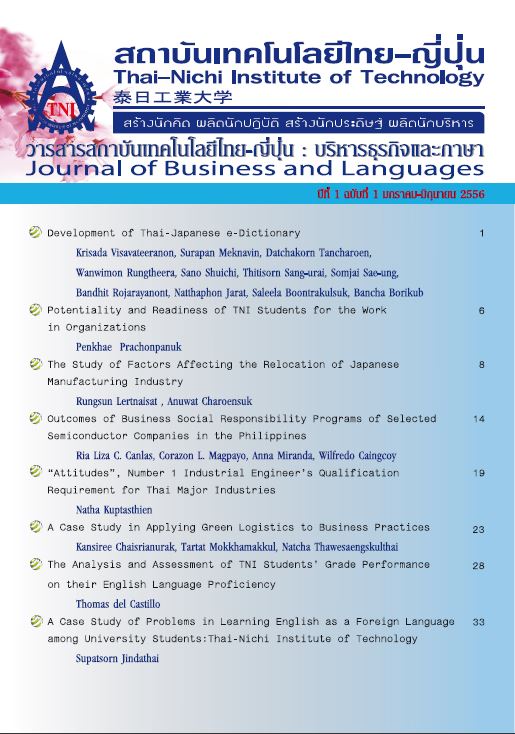Distinctive Competencies in the Knowledge Economy as Driving Trends in Higher Education : A Case Study of English Instructors, College of General Education and Languages, Thai-Nichi Institute of Technology
Main Article Content
Abstract
The notion of knowledge economy is marked as a shift from the old economy of the industrial age. As in a new economy which depends on knowledge, ingenuity, innovation, and mobilization of the talents of all, it is significant for government leaders to develop all the potential of their human capital. However, limited research attention has been studied in the context the factors to develop students’ competencies by teachers in education. This research investigates the pedagogy employed by English instructors, College of General Education and Languages, Thai-Nichi Institute of Technology by using indepth face-to-face interview and classroom observation. Research findings indicate that the participants attempted to develop a human capital in the students using various enhancement strategies such as student-centred learning environment and creativity and critical thinking environment. Further, this research highlights the importance of globalization, knowledge production, teaching-learning process and pedagogy literatures.
Article Details
Article Accepting Policy
The editorial board of Thai-Nichi Institute of Technology is pleased to receive articles from lecturers and experts in the fields of business administration, languages, engineering and technology written in Thai or English. The academic work submitted for publication must not be published in any other publication before and must not be under consideration of other journal submissions. Therefore, those interested in participating in the dissemination of work and knowledge can submit their article to the editorial board for further submission to the screening committee to consider publishing in the journal. The articles that can be published include solely research articles. Interested persons can prepare their articles by reviewing recommendations for article authors.
Copyright infringement is solely the responsibility of the author(s) of the article. Articles that have been published must be screened and reviewed for quality from qualified experts approved by the editorial board.
The text that appears within each article published in this research journal is a personal opinion of each author, nothing related to Thai-Nichi Institute of Technology, and other faculty members in the institution in any way. Responsibilities and accuracy for the content of each article are owned by each author. If there is any mistake, each author will be responsible for his/her own article(s).
The editorial board reserves the right not to bring any content, views or comments of articles in the Journal of Thai-Nichi Institute of Technology to publish before receiving permission from the authorized author(s) in writing. The published work is the copyright of the Journal of Thai-Nichi Institute of Technology.
References
Powell, W.W. and Snellman, K. (2004), “The Knowledge Economy”, Annual Review of Sociology, August, Vol.30, pp. 199-200.
Shapiro, C. and Varian, H.R. (1998), “Information Rules: A Strategic Guide to the Network Economy”, The Journal of Technology Transfer, Vol. 25(2), 250-252.
Drucker, P. F. (1993). Post-Capitalist Society. New York: Harper Business.
Nonaka, I., Takeuchi, H., & Umemoto, K. (1996). A theory of organizational knowledge creation. International Journal Technology Management, Vol.11, pp. 833-845.
OECD 1996, “The KNOWLEDGE-BASED ECONOMY”, GENERAL DISTRIBUTION, https://www.oecd.org/dataoecd/51/8/1913021.pdf, accessed on January 2011
Brown, P., Kayder, H., and Ashton, D. (2008), “Education, globalization and the knowledge economy”, A commentary by the Teaching and Learning Research Programme, https://www.tlrp.org/ pub/documents/globalisationcomm.pdf, accessed on January 2011
Agrawal, V. (2011), “Globalization and Knowledge Economy as Driving Trends in Higher Education- Impact Analysis”, Eighth AIMS International Conference of Management, January 1-4, 2011
Stevens, C. (1996), “The knowledge-driven economy”, OECD observer, June-July 1996, (200), pp.6-10
Guruz, K. & Pak, N. K. (2002), Globalization, knowledge economy and higher education and national innovation systems: the Turkish case.https://www.congresslifelonglearning.de/download/5-2-6_doc_gueruez.pdf, accessed on February 2011
Hargreaves, D. (2000), Knowledge management in the learning society. CERI, OECD, Paris: The Organization
Carnevale, A.P., Schultz (1990), “Return on investment: accounting for training”, Training &Development Journal, Vol.44, No. 7, July, pp. 41-72.
Woods, N. (2000). “Order, globalization and inequality in world politics”. In D. Held & A.McGrew (Eds.), The Global transformations reader: an introduction to the globalization debate. Cambridge: Polity Press.
Tan, C. (2005), “The potential of Singapore’s ability driven education to prepare students for a knowledge economy”, International Education Journal, Vol. 6(4), pp. 446-453
Horner, D.J. and Matson, J.V. (2001), “Teaching Creativity, Innovation and Change in the Leaderless Classroom”, 2001 ASEE National Conference Proceedings. Session 3242.
Graham, C. (2005), Enterprise Education, N.S.W: Pearson
Parker and Chao (2007), “Wiki as a Teaching Tool”, Interdisciplinary Journal of Knowledge and Learning Objects, https://ijklo.org/Volume3/IJKLOv3p057-072Parker284.pdf, accessed on January 2011
Haddad, W. D., and Jurich, S. (2002). ICT for education: prerequisites and constraints. In W. D. Haddad and A. Draxler (Eds.), Technologies for Education: Potential, Parameters and Prospects. For UNESCO by Knowledge Enterprise.
Lauder, H, Brown, P and Ashton, D (2008) “Education, Globalization and Skill”, in McCulloch, G and Crook, D, (Eds.), The Routledge International Encycolpedia of Education, London: Routledge.
Kefela, G.T. (2011), “Knowledge-based economy and society has become a vital commodity to countries”, International NGO Journal, Vol.5(7), pp. 160-166
Florida, R. and Inagli, I. (2004), EUROPE IN THE CREATIVE AGE,https://www.creativeclass.com/rfcgdb/articles/Europe_in_the_Creative_Age_2004.pdf. accessed on January 2011


